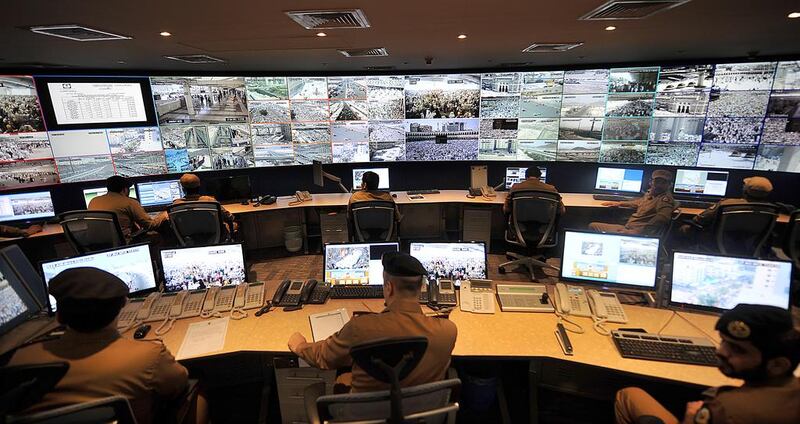ABU DHABI // Saudi Arabia will rely on surveillance technology, a 60,000-strong security force, and private contractors to protect this year’s Haj after taking a hardline stance against Islamist extremism.
While there are few signs that pilgrims are concerned about security, Saudi authorities are not taking any chances as they maintain a close eye on the threat posed by groups such as Al Qaeda and ISIL.
“I would not put it past ISIS to try to disrupt the Haj and I think Saudi authorities are well aware of that possibility,” said Fahad Nazer, a terrorism analyst at Virginia-based JTG Inc and a former political analyst at the Saudi embassy in Washington, using an alternative acronym for ISIL.
Earlier this month, Saudi Arabia joined a coalition of countries that will combat ISIL.
The country’s Council of Senior Religious Scholars followed up with a fatwa backing government efforts to apprehend individuals who join extremist groups, along with their financiers. Saudi security forces have also rounded up dozens of foreigners and citizens this year, over suspicions that they were plotting to carry out attacks.
“There are various tribes and other folks, young people, who are attracted to Da’ash,” said Theodore Karasik, director of research and consultancy at the Dubai-based Institute for Near East and Gulf Military Analysis, using a slang term for ISIL. “These people we have seen have been monitored and arrested.”
To decrease the risk of attacks and other dangers, Saudi Arabia has over the past few years significantly boosted security for the Haj, which draws up to 2 million visitors each year, Mr Karasik said.
“The Saudis have learned a lot of lessons from previous disasters and events.”
Thousands of CCTV cameras have been installed around the country, especially around the holy sites. Facial recognition technology will be used and a new electronic system of screening Haj permits has been established.
The British contractor G4S, which has offices in Jeddah, will provide additional assistance, along with a security force of around 60,000 officers.
"These forces will be stationed in Mina, Arafat and Muzdalifah to ensure the safety of pilgrims and enable them to perform their rites with ease and comfort," said Major General Osman Al Mahraj, director of general security, in the Saudi Gazette.
The number of security officials is actually about 35,000 less than it was for last year’s Haj, Mr Karasik said. This is because of an increased reliance on technology including extensive pre-departure screening, he said.
These measures complement other recent efforts to step up security, including a high-tech fence that will protect its borders and the reported procurement of unmanned aerial vehicles.
“It’s become very clear in the past few months that Saudi leaders – including King Abdullah himself – take the threat posed by ISIS very seriously,” Mr Nazer said.
“Part of it is due to the increasing ranks, coffers and firepower of the group and reports that it has attempted to advance closer to the Saudi border.”
While it might seem unlikely that even those opposed to the ruling Al Sauds would carry out an attack during a time that is sacred to all Muslims, it is not without precedent. In 1979, Islamist militants attacked the Grand Mosque in Mecca just after the Haj.
The group – composed of Saudi citizens – was overcome only after a two-week battle with security forces.
The threat posed by such extremists appears even greater now than it did in 1979, with conflict zones such as Syria giving militants the ability to gain combat experience.
Other countries in the region have experienced a drop in visitors since ISIL’s rise. A travel agent in Istanbul said the threat posed by extremist groups has made some travellers more wary. “...business for Turkey is down,” he said.
Yet, few pilgrims have been dissuaded from performing the Haj.
“[Saudi authorities] do facilitate a heavy security presence to ensure the safety of pilgrims is not compromised,” said Rashid Mogradia, head of the council of British Hajjis, a London-based non-profit that advises pilgrims on the Haj.
“Everyone is travelling now,” said Mohammed Furqan, a London-based travel agent.
He said he had booked 120 people for Haj trips this year and there were no cancellations. If the British or Saudi government advised against performing the Haj there would be cancellations, he said.
But so far such a warning has not been issued.
jvela@thenational.ae





